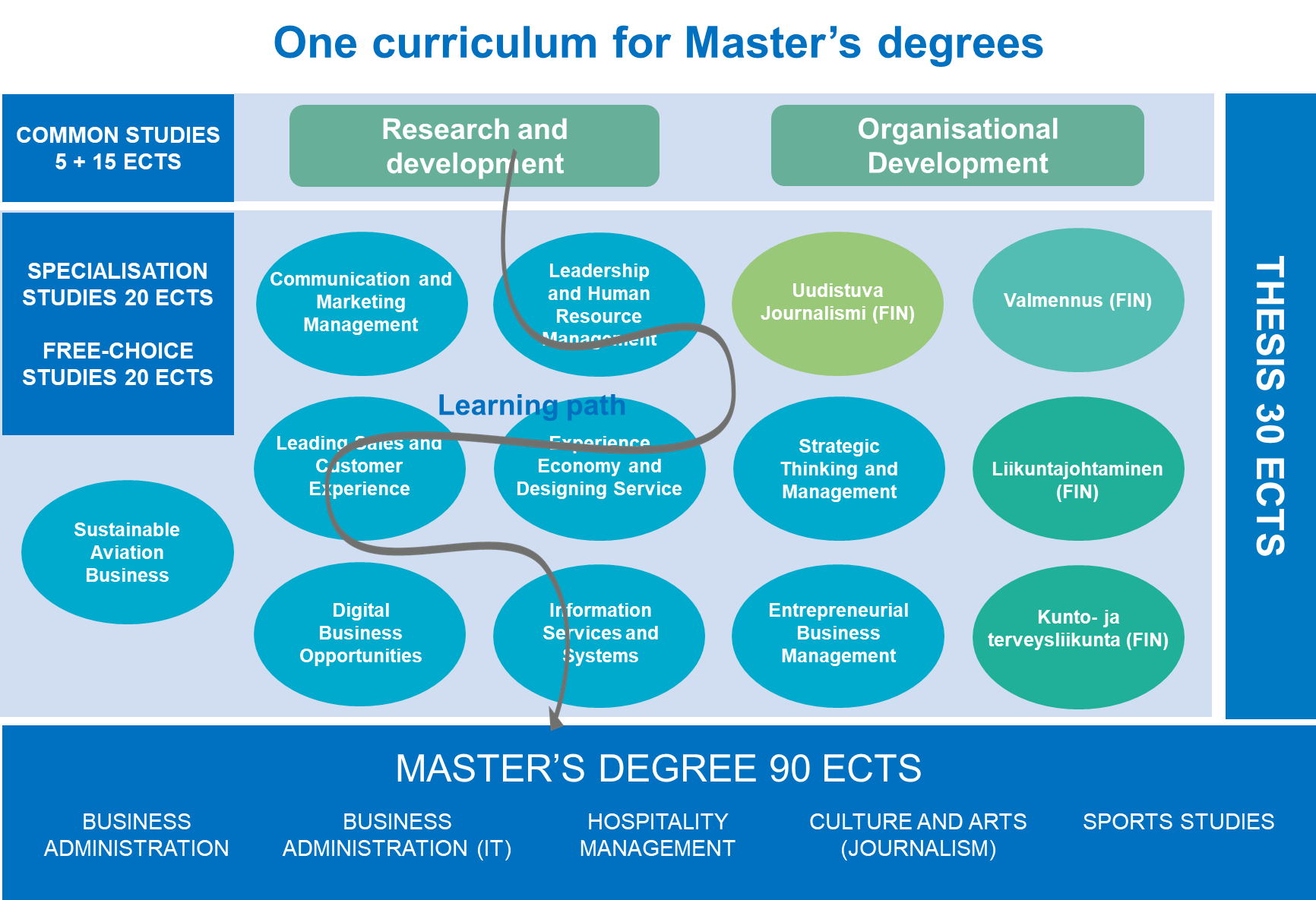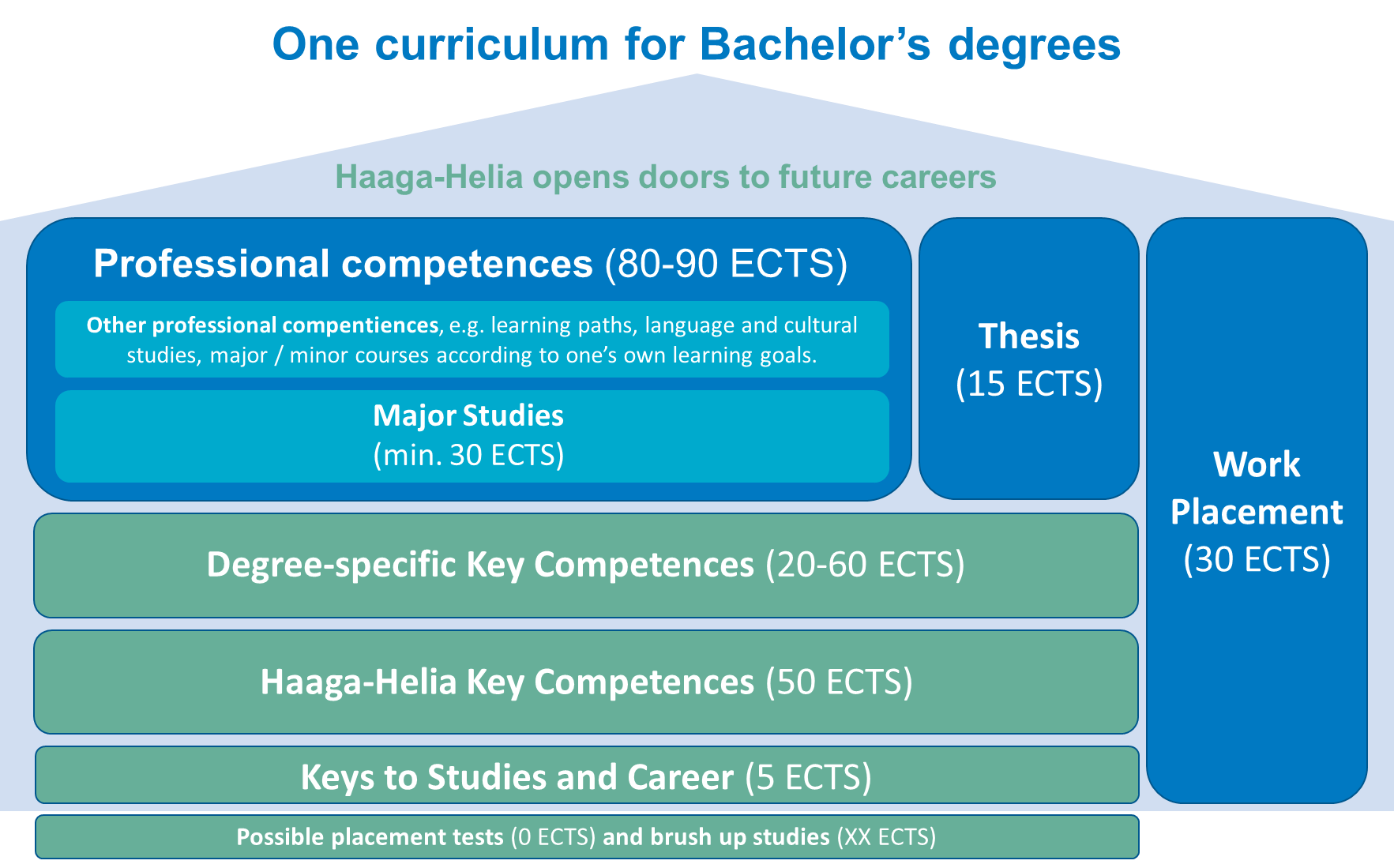A dynamic competence-based and working-life oriented approach is an essential feature for Haaga-Helia – enhancement areas exist in communication
The newly implemented institutional strategy (Haaga-Helia Strategy for 2021-2025/2030) and the ideas and aims of the educational reform are deeply rooted in Haaga-Helia’s pedagogical vision to be a HEI with strong networks in Finland and abroad. Furthermore, they are based on the idea of “dynamic competence”. The self-assessment report and the interviews provided evidence that Haaga-Helia’s community members are courageous and willing to do their best in realising this pedagogical vision. There is a clear focus on utilising the possibilities offered by technology to improve the quality and flexibility of education, i.e., through enabling flexible and diverse learning paths. In regard to curricula, the new strategy takes into account conformity with the qualification goals of the National qualification framework, compliance with legal requirements, in particular state-specific structural requirements, as well as the corresponding FiNQF and European EQF levels.
The audit team was able to ascertain through the site visit as well as through the self-assessment report that the quality assurance measures were developed after thorough preliminary clarifications and in-depth consultations with staff, students and stakeholders and are now well accepted and supported among all throughout the HEI. Haaga-Helia considers the competence orientation of their degree programmes to be a crucial quality standard. This allows for adaptability and modernization through flexible tuning. Hence, the programmes are based on action-oriented learning objectives and competence-oriented forms of examination, enabling not only learning theoretical knowledge but also workforce skills, opening the idea of continuous learning.
Haaga-Helia has established close project partnerships and networks with regional working life, enabling them to educate a skilled workforce that is well-equipped to meet future demands and that reacts to changing environments in an agile manner. A crucial element of this approach is the active participation of all stakeholders, which was confirmed in the interviews, as teachers, supervisors of educational and competence areas and representatives of working life have continuous discussions on this matter. This collaboration has facilitated the inclusion of business stakeholders in development processes, providing valuable input and feedback to Haaga-Helia.
Nevertheless, the systematic inclusion of feedback from all stakeholders could be further improved along with the clear communication of these processes. In the interviews, it became clear that cooperation and communication can still be expanded and strengthened regarding planning of education.
Students’ learning experiences are focused but may vary from student to student
Haaga-Helia has made substantial efforts to bringing learning environments, RDI projects and working-life relevant education together. Especially the Work&Study model offers many opportunities for students to practice experimental activities. The new concept of gaining competences through working life experience is also evident in summative and formative assessments, which connect practical work with the relevant theory. The progress of students is also well monitored by means of data use, i.e., the study management system.
Both national and international networks, such as 3AMK and Ulysseus, offer a great opportunity for students to complete courses at other institutions. Nevertheless, the audit team learned from the interviews and the workshops that students’ learning experiences as well as work placement and internship opportunities are to some extent uneven regarding international (incoming) students. The interviews underlined that the opportunities for international students are limited to jobs where minimal to no Finnish language skills are required. It was reported that there is a “huge gap between native Finnish speakers and non-Finnish speakers when it comes to given opportunities” and that “It feels that the Finnish students have more connections and resources than the international students”. The audit team encourages Haaga-Helia to better prepare international students for the Finnish labour market and to enhance opportunities for internationalization, i.e., by taking care of providing equal learning and research experiences for all students—domestic and international—in all programmes, and formats. Additionally, during the student workshops, it was noted that some course materials for international students were not available in English or were not up to date. Students also expressed that some teachers should improve their language skills to better facilitate the learning of international students.
Curriculum design and agile enhancement processes enable a flexible choice of studies and a modern learning environment but are still in transition
Haaga-Helia has a very good reputation among students and among regional stakeholders because of systematic planning processes that ensure relevance for working life and that focus on the needs of their students. The interviewees valued the fact that Haaga-Helia offers and enables flexibility in its curriculum development and renewal process, and recognizes the crucial role that students play in setting objectives. The decision-making processes, competencies and responsibilities in the management system for teaching and learning are clearly defined. To ensure that the strategic goals are turned into operational activities, they are discussed regularly with a variety of stakeholders (i.e., in OSTU meetings). Through the interviews, it has become clear to the audit team that Haaga-Helia’s curriculum work was developed systematically with the aim of continuously improving the quality of its degree programmes. At Haaga-Helia, objectives are established collaboratively by various focus groups, including students. Hence, the planning of education and degree programmes are based on clear development and planning cycles (PDCA) and, from the auditors’ point of view, guarantee the implementation of qualification goals and targeted learning outcomes in degree programme concepts that are within the scope of the programme and ensure the achievement of the targeted qualification level and qualification profile. This enables target-oriented learning and enables a focus on the active role of students in their own learning process to obtain competence, to learn work-life skills and to prepare for developing and researching work life. As part of curriculum development, the assessment criteria, assessment formats, didactic methods, and learning environments are aligned with the intended learning outcomes. This process includes evaluation of student workload, application of ECTS, appropriate modularization, adequate examination organization, advising and counselling services, consideration of gender equity, and accommodation of the special needs of students. Feedback from course evaluations and student representatives, such as workload feedback, is also taken into account when planning educational programs. The interviews confirmed the strong involvement of students in the programme development cycle.
Nevertheless, in the interviews it became clear that the education reform is still in a transitional phase, as stated in the self-assessment report. It should be consequently followed up and improved, i.e., in the focus of planning of course portfolios as well as regarding the equality of workload for all study options (virtual, online, blended or contact).

